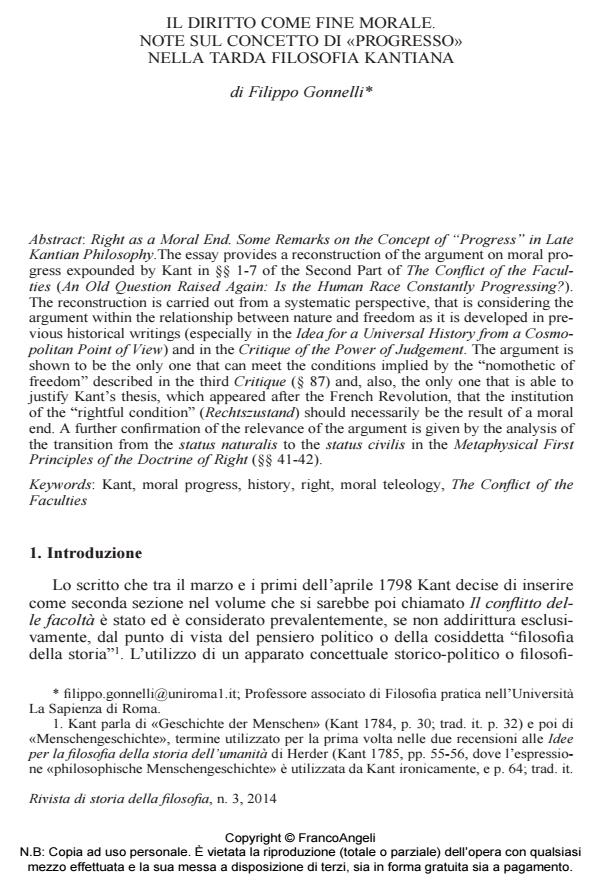Il diritto come fine morale. Note sul concetto di "progresso" nella tarda filosofia kantiana
Titolo Rivista RIVISTA DI STORIA DELLA FILOSOFIA
Autori/Curatori Filippo Gonnelli
Anno di pubblicazione 2014 Fascicolo 2014/3
Lingua Italiano Numero pagine 32 P. 443-474 Dimensione file 122 KB
DOI 10.3280/SF2014-003003
Il DOI è il codice a barre della proprietà intellettuale: per saperne di più
clicca qui
Qui sotto puoi vedere in anteprima la prima pagina di questo articolo.
Se questo articolo ti interessa, lo puoi acquistare (e scaricare in formato pdf) seguendo le facili indicazioni per acquistare il download credit. Acquista Download Credits per scaricare questo Articolo in formato PDF

FrancoAngeli è membro della Publishers International Linking Association, Inc (PILA), associazione indipendente e non profit per facilitare (attraverso i servizi tecnologici implementati da CrossRef.org) l’accesso degli studiosi ai contenuti digitali nelle pubblicazioni professionali e scientifiche.
The essay provides a reconstruction of the argument on moral progress expounded by Kant in §§ 1-7 of the Second Part of The Conflict of the Faculties (An Old Question Raised Again: Is the Human Race Constantly Progressing?). The reconstruction is carried out from a systematic perspective, that is considering the argument within the relationship between nature and freedom as it is developed in previous historical writings (especially in the Idea for a Universal History from a Cosmopolitan Point of View) and in the Critique of the Power of Judgement. The argument is shown to be the only one that can meet the conditions implied by the "nomothetic of freedom" described in the third Critique (§ 87) and, also, the only one that is able to justify Kant’s thesis, which appeared after the French Revolution, that the institution of the "rightful condition" (Rechtszustand) should necessarily be the result of a moral end. A further confirmation of the relevance of the argument is given by the analysis of the transition from the status naturalis to the status civilis in the Metaphysical First Principles of the Doctrine of Right (§§ 41-42).
Parole chiave:Kant, moral progress, history, right, moral teleology, The Conflict of the Faculties
- Pubblicità, educazione e diritto in Kant (ISBN:978-88-5518-670-4)
Filippo Gonnelli, Il diritto come fine morale. Note sul concetto di "progresso" nella tarda filosofia kantiana in "RIVISTA DI STORIA DELLA FILOSOFIA" 3/2014, pp 443-474, DOI: 10.3280/SF2014-003003